Eumenes of Cardia. The last defender of the family of Alexander the Great
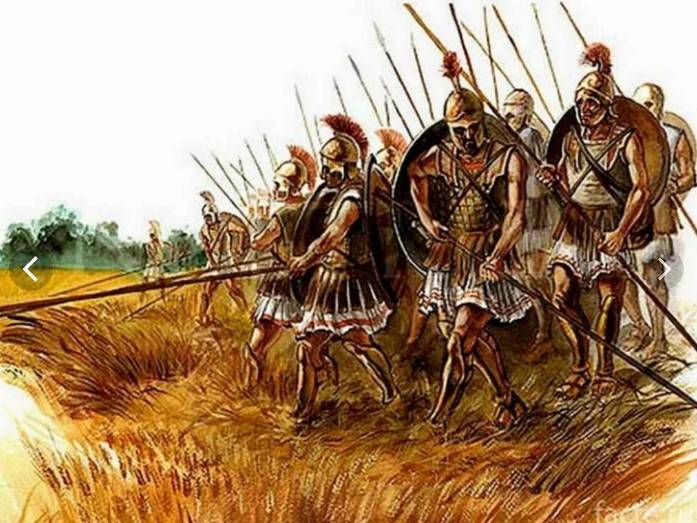
Earlier, we talked about the origin and youth of Eumenes, a Greek from Kardia, who became the archigrammat (manager of the chancellery) of Alexander the Great, and after his death, along with Perdiccas, was a supporter of maintaining a unified state and a defender of the Argead dynasty. Perdiccas was killed by his own subordinates during a campaign in Egypt, but Eumenes won two resounding victories on his front in Asia Minor - over the governor of Armenia, Neoptolemus, and the beloved commander of the Macedonian army, Crater. For this, at a meeting of the Macedonian army, he was outlawed and sentenced to death.
As we remember from previous article, the last ruler of the state of Alexander was Antipater, who began his career as a commander under the father of this king, Philip II, and was even his friend. Antipater took the heirs of Alexander (the half-brother of Philip and the young son of the conqueror Alexander) to Macedonia. To carry out the will of the assembly of the army that sentenced Eumenes to death, he instructed Antigonus One-eyed, who ruled the satrapy located west of the province of Eumenes.
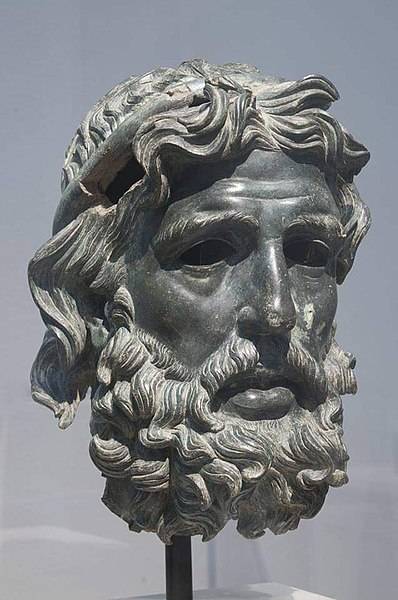
Supposed depiction of Antigonus One-Eyed
Antigonus accepted this commission with great enthusiasm, hoping to annex the lands of Eumenes to his possessions.
Antigonus vs. Eumenes
The war between Eumenes and Antigonus, who are often called the most talented commanders among the Diadochi, lasted three years. The first battle - at Orkinia, Eumenes lost due to the betrayal of two commanders. He was forced to take refuge in the mountain fortress of Nora, which Antigonus's army did not succeed in taking. Leaving part of his troops for the siege, Antigonus went to subdue Paphlagonia and Cappadocia. He defeated the army of Perdikkas' brother Alketes, forcing him to commit suicide in the besieged Thermis. Antigonus soon became the ruler of all of Asia Minor, only formally submitting to the regent Antipater.
The situation changed dramatically in the summer of 319 BC. e., when, dying, Antipater appointed as the successor not his son Cassander, but the 75-year-old Polyperchon, the former commander of the phalanx of Alexander. Outraged, Cassander fled to Antigonus, who was glad to start a new war. Now he hoped to capture Macedonia and Greece and become the regent of the empire (and later, perhaps, the king). By this time, the number of his troops, although dispersed over a large territory, reached 60 thousand infantrymen and 10 thousand cavalry soldiers. Antigonus also had 70 elephants at his disposal. Antigonus, of course, did not plan to give Macedonia to Cassander, intending only to use him in the war with Polyperchon. Handing Cassander 35 ships and 6 thousand soldiers, Antigonus sent him to fight in Greece. He himself, having entered into an alliance with Ptolemy, defeated the fleet of Polyperchon, commanded by Clit the White, and was preparing to transport his army through the Hellespont.
In this situation, Polyperchon decided to ally with Eumenes. He not only confirmed his rights to his former possessions, but also appointed him a strategist of Asia. Under the command of Eumenes, the corps of the famous argyrospids of Alexander the Great also passed. The power of Eumenes was recognized by many governors of the eastern provinces.
In turn, Antigonus entered into negotiations with Eumenes, sending to him Jerome of Cardia, mentioned in the first article, the future “historian of the Diadochi”, a countryman and friend of the hero of the article, as an envoy. However, Eumenes remained loyal to the Argead dynasty.
Asian Strategist
Having lulled the vigilance of Antigonus through negotiations, Eumenes managed to escape from the Nora fortress at the head of 500 horsemen. Joining along the way the detachments recruited in Cappadocia, he arrived in Cilicia. Here he took command of the army and, having received gold from the royal treasury in Sind, he recruited several thousand more soldiers in Phoenicia, Syria, Pisidia, Lycia and on the island of Cyprus. As a result, he had at his disposal about 12 infantrymen (including 3 argyrospides) and up to XNUMX horsemen. Olympias called on Eumenes for help and even wanted to appoint him as the tutor of his grandson - the son of Alexander from Roxana.
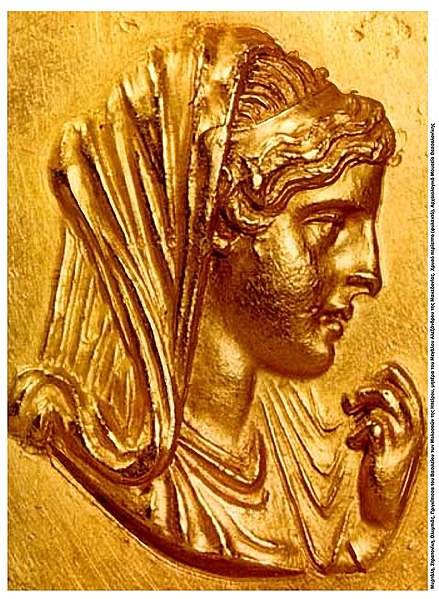
Olympias on a Roman medallion minted under the emperor Caracalla
Eumenes was going to cross to Macedonia on the ships that he began to build in Phoenicia, but these plans had to be canceled after Antigonus's victory over fleet Polyperchon.
Meanwhile, the appearance of the army of Eumenes in Asia Minor forced Antigonus to cancel his expedition to Macedonia. At the end of the autumn of 318, he moved against Eumenes a 24-strong army (20 infantry and 4 horsemen). Eumenes preferred to retreat to the east, where in the province of Susiana he was joined by the troops of some satraps, numbering more than 18 thousand infantry and about 4 thousand horsemen. Evdam, the satrap of India, the former taxiarch of the Thracian parts of Alexander, whom Diodorus Siculus calls the murderer of King Porus, brought 120 elephants. Antigonus received help from his allies - Seleucus and Python. Eumenes captured Seleucus' Babylon but was unable to get his army across the Tigris because the diadochus ordered the dam to be destroyed. Antigonus went to help Seleucus and Python, but in the spring of 317, Eumenes won a victory near the Koprot River: here, in front of the soldiers of the main enemy army, he defeated a seven thousandth detachment that had crossed this tributary of the Tigris.
After this, Antigonus was forced to retreat to Media, whose satrap was his ally Python. During the transition, his army suffered rather heavy losses in skirmishes with the Kossei tribe. Eumenes also led the army to winter quarters. It must be said that here, too, this Greek faced the Macedonian opposition. Satrap of Persia, Peucestes, a former somatophylac of Alexander, who was proud of the fact that in 325 BC. e. saved the king during the storming of the city of the Indian tribe of Mallas, claimed command of the united army due to the importance of his province.
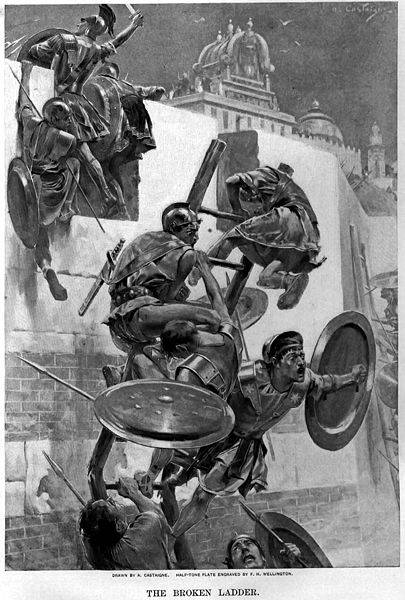
Andre Castaigne. Alexander and a few companions within the Mallian town
The new commander of the argyrospids, Antigens, demanded that the strategist be chosen at a meeting of the Macedonian army. As for the ordinary argyrospids, whom Diodorus Siculus called "invincible troops, whose glory and deeds caused considerable fear among the enemies" and "troublemakers”, then these “authoritative” warriors used to swear allegiance to the commanders only after receiving full prepayment for their services. During 317 B.C. e. they managed to receive a salary from Eumenes three times - and they swore allegiance to him the same number of times.
Speaking of the winter camp of Eumenes' army, Plutarch describes it as "a place of holidays, debauchery, as well as pre-election intrigues”and compares with ... a democratic state. It is simply amazing that Eumenes then managed to restore at least some order.
The fighting resumed in the autumn of 317, when Antigonus's army met with the troops of Eumenes, who stood in its way, blocking the road to the lands of Seleucus near the modern city of Isfahan.
Battle of Paretaken
A description of this battle (as well as the Battle of Gabiene) can be found in "Historical library” by Diodorus Siculus, “Biography” by Eumenes Plutarch, “Strategems” by Polien and in the work of Cornelius Nepos “On famous foreign commanders”. Among other things, this battle is also famous for being the first in which independent command was entrusted to the son of Antigonus, Demetrius. At that time he was 19 years old, this commander will go down in history under the nickname Poliorket (Besieger of the city).
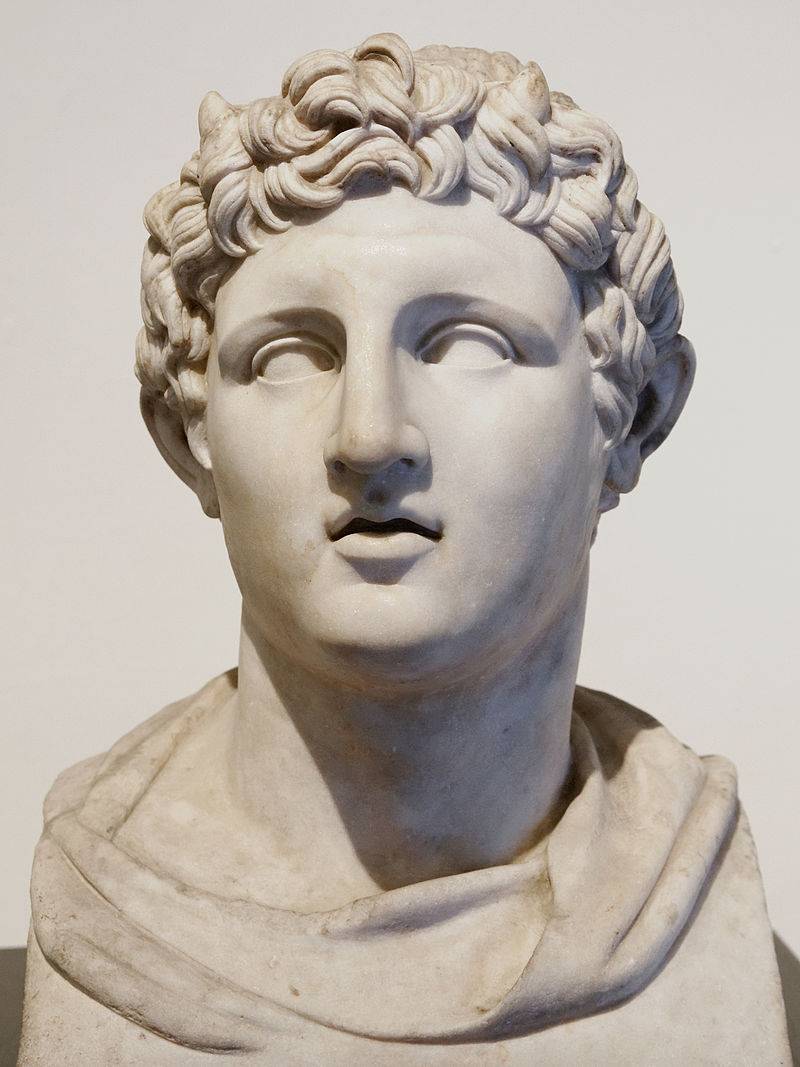
Demetrius I Poliorcetes. Roman copy of the XNUMXst century AD. e. from a Greek bust of the XNUMXrd century BC. e. Naples
By this time, the balance of forces of the opposing sides turned out to be as follows: the infantrymen were approximately equal (about 35 thousand in the royal army against 33 thousand in Antigonus), but Antigonus had an advantage in heavy infantry. He also had more cavalry soldiers (about 10 thousand against 6 thousand). But Eumenes had more elephants (125 versus 65).
Eumenes evenly distributed his elephants along the entire front, while Antigonus placed all the elephants on the left flank. In the center on both sides lined up heavily armed infantry, on the flanks - light infantry and cavalry. At the same time, the elite infantry units of Eumenes, the Macedonian argyrospides and hypaspists, who occupied positions in the center, were qualitatively superior to the similar formations of Antigonus, although they were inferior to them in numbers.
The results of the battle turned out to be ambiguous: the cavalry units of Eumenes were successful on one of the flanks. His foot soldiers overturned the enemy phalanx, but, pursuing it, lost their formation, came under attack from the horsemen of the right flank of Antigonus's army, commanded by the 19-year-old son of this diadochus, Demetrius. It was this attack that saved the army of Antigonus from defeat: the foot soldiers of the left flank of the advancing phalanx of Eumenes suffered heavy losses and were forced to stop. At the end of the day, both armies returned to their original positions, retaining their combat effectiveness and readiness for a new battle. Diodorus Siculus states:
The losses of Antigonus were much higher, but the soldiers of Eumenes demanded to retreat to the convoy, where there were not only valuables that belonged to them personally, but also their wives with children. As a result, it turned out that the battlefield remained with the army of Antigonus. However, he was unable to break into the domain of Seleucus, where he planned to station his people for the winter. Without revealing a clear and indisputable winner, the armies of Eumenes and Antigonus dispersed in different directions.
Battle of Gabiene
During a break in hostilities, “democracy” again flourished in the troops of Eumenes. According to Plutarch, the subordinate satraps tolerated Eumenes only because the army trusted him only as a commander, considering him “the only one capable of commanding and waging war', and 'sparing the lives of soldiers". And the Macedonian warriors themselves considered them to be just good organizers and managers of feasts and all kinds of holidays. And because the satraps allegedly agreed to kill Eumenes immediately after the victory over Antigonus. In the meantime, not expecting an attack, they dispersed their troops in a valley located on the border of Media and Persia. Only his own few troops remained with Eumenes. Informed of this by his spies, Antigonus decided to break the enemy forces piecemeal. However, Eumenes, waiting for the approach of the main forces, set up camp on a hill, setting up many empty tents and lighting a large number of fires at night. Frustrated, Antigonus did not dare to attack Eumenes immediately, giving him time to gather allied troops. Finally, in the spring of 315 BC. e. the enemy armies entered the battle, which became fatal for Eumenes. The strategist of Asia had more foot soldiers (about 36 thousand against 22 thousand) and elephants (114 against 65), but Antigonus retained an advantage in cavalry (9 thousand against 6 thousand). The strike force of Eumenes was still the argyrospides, of which Diodorus Siculus writes:
Since cavalry units traditionally operated on the flanks, Eumenes had to somehow hold his positions here until his phalanx overturned the enemy infantry in the center. And so he reinforced the left flank with sixty elephants, against which Antigonus was preparing a decisive blow. This (right) flank was commanded by Demetrius, the left was commanded by the satrap of Media Pithon, allied with Antigonus. Antigonus immediately got a head start, as the one and a half thousandth cavalry detachment of the satrap of Persis Pevkest went over to his side. And then the leader of the elephants, Eumenes, was killed, who now, being frightened, ran back. Eumenes himself was surrounded and with difficulty managed to break through to his troops. But his phalanx did succeed. Diodorus claims that the "aged" argyrospides of Eumenes
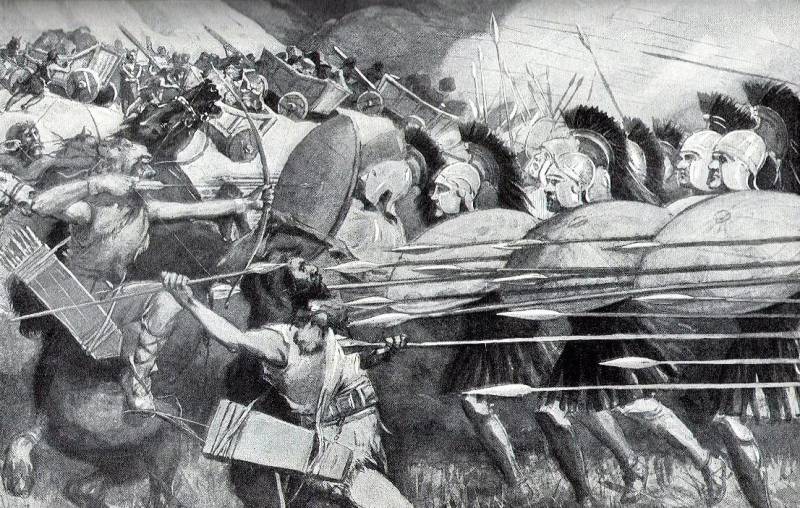
Polian says:
If not for the betrayal of Peucestus, whose cavalry could decide the fate of the battle, the battle would have ended with a terrible defeat of the troops of Antigonus. But even now the outcome of the battle was not determined. Diodorus says:
Everything was decided by the breakthrough of the Median cavalry detachment to the camp of Eumenes: the “valiant” argyrospides, out of fear of losing their accumulated wealth, betrayed their commander Antigonus. Ironically, the warriors of Neoptolemus once did the same, who went over to the side of Eumenes in exchange for the promise of the preservation of personal property, with which they were going to someday return to Macedonia.
Despite the intercession of Demetrius, the son of Antigonus, and one of the old associates of Alexander Nearchus, Eumenes was sentenced to death and executed three days later.
On the fate of the argyrospids who betrayed Eumenes, Polien reports that Antigonus "honored them with abundant gifts", but then:
And here is what Plutarch writes about them:
The commander of the argyrospides, Antigen, was placed in a wooden coffin and burned alive. The satrap of India Evdam was also executed. Diodorus Siculus says this:
Jerome of Cardia, a fellow countryman and friend of Eumenes, after the death of this commander, went to the service of Antigonus, then served his son Demetrius Poliorket. He died in Macedonian Pella about 250 BC. e. Jerome wrote The History of Alexander's Succession to the Throne, Now Lost, in which he spoke flatteringly of Eumenes and his new patrons. Plutarch, Diodorus Siculus and Cornelius Nepos referred to his work in their works. In addition, some information about Eumenes can be found in the work of Arrian "Anabasis of Alexander" (another name is "The History of the Campaigns of Alexander the Great") and in the "Macedonica" mentioned in the first article by Duris of Samos.
What happened to Antigonus? After the victory over Eumenes, this diadochus became too strong, which worried the rulers of other "shards" of Alexander's empire. Ptolemy, Lysimachus, Cassander and Seleucus, united, began a war against him. In the battle of Gaza (312 BC), they managed to defeat the son of Antigonus - Demetrius. But the war continued, and in 307 BC. e. Antigonus and Demetrius, who liberated Athens and Attica from the Macedonian troops of Cassander, began to be given divine honors there: in a specially written hymn, Demetrius was called the son of Poseidon and Aphrodite. In 306 BC. e. these "living gods" were the first among the Diadochi to proclaim themselves kings. And Demetrius, one of the first among the kings of the Western world, ordered to mint coins with his portrait - until that time, images of gods or dead heroes were applied on the front of the coins (the Diadochi used the image of Alexander the Great).
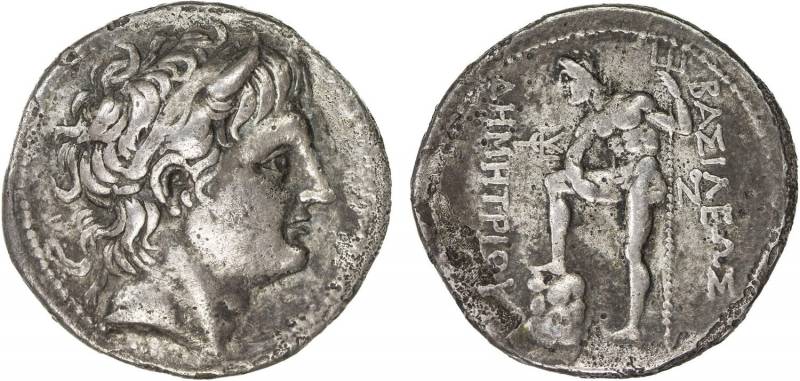
Demetrius I Polyorcetes on a tetradrachm minted 294-288 BC e.
The war of the Diadochi against Antigonus and Demetrius continued with varying success until 301 BC. e., when Antigonus was killed in a grandiose battle at Ipsus, and his power was divided by the victors. Demetrius Poliorketes fought until 285 BC. e., but he was forced to surrender to his father-in-law Seleucus Nicator and died two years later in the city of Apomea with the rank of an honorary prisoner. But his son Antigonus Gonatas, who managed to hire up to 9 Celts and negotiate an alliance with Aetolia, conquered Macedonia in 276 BC. e.
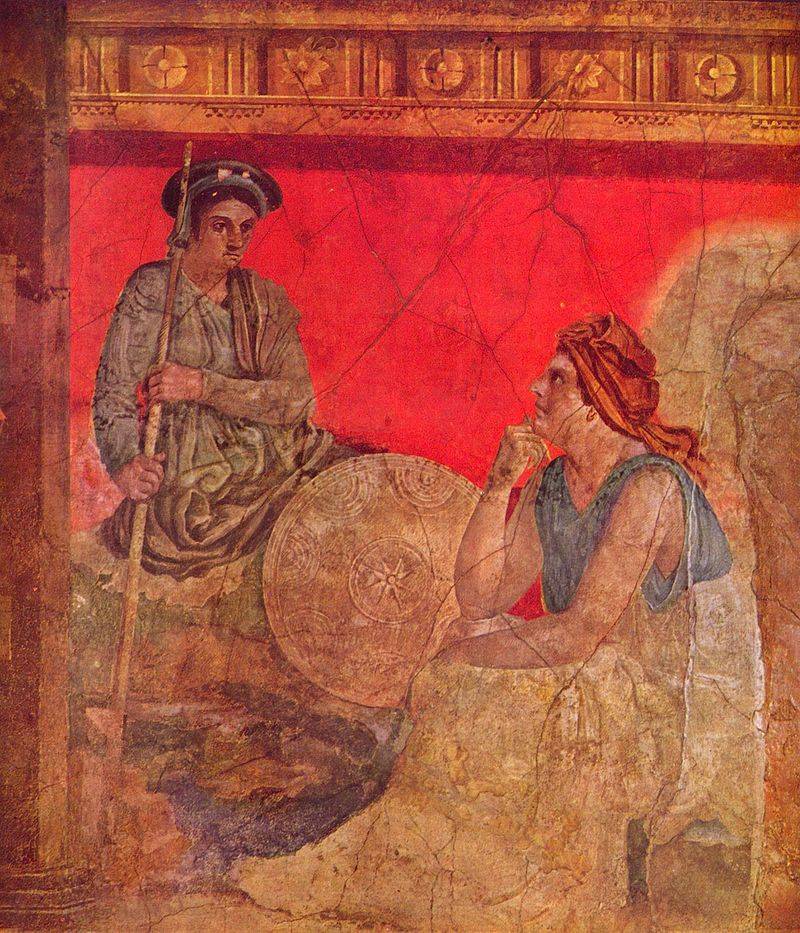
Antigonus II Gonatas and his mother Phila, daughter of Antipater. Detail of a fresco from Pompeii, circa 40 BC. e.
He became the founder of the Macedonian Antigonid dynasty, the last representative of which was King Perseus.
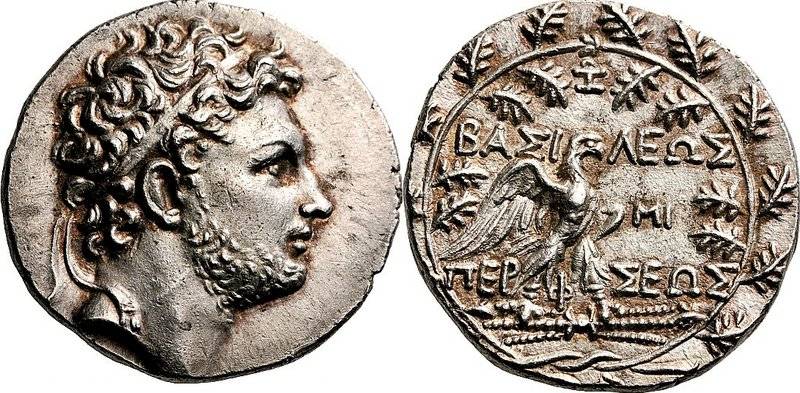
Tetradrachm of the last Macedonian king Perseus, minted between 179-172. BC e.
June 22, 168 BC e. he was defeated by the Romans at the Battle of Pydna, after which Macedonia forever lost its independence.
Information